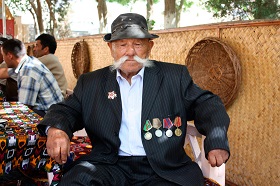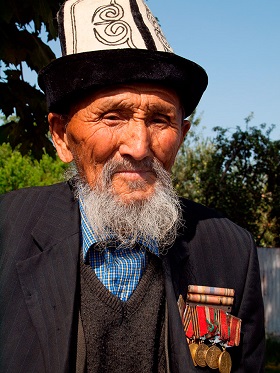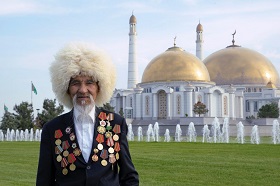The Great Patriotic War has deeply scarred the memory of people across the vast territorial expanse of the former Soviet Union. However, as time passes, and veterans pass away, the event is increasingly viewed as a subject in a textbook, which raises the need to keep the memory of the war alive within the population.
The Great Patriotic War has deeply scarred the memory of people across the vast territorial expanse of the former Soviet Union. However, as time passes, and veterans pass away, the event is increasingly viewed as a subject in a textbook, which raises the need to keep the memory of the war alive within the population.
On the eve of the 70-th anniversary of Victory Day, most post-Soviet countries held large celebrations culminating in the May 9 military parade in Moscow. All the Central Asian republics also hold celebratory and commemorative events, surviving Great Patriotic War participants and home-front workers receive allowances, service medals and gifts, many of them attend special meetings and concerts or travel to health spas and recreation centers at the expense of their governments. On the face of it, the Central Asian approach seems very similar to that taken by the Russian Federation and Belarus.
The war further away that it seems
However, as time elapses, the perception of the Great Patriotic War in Central Asia is becoming markedly different from that in Russia, Ukraine or the Baltic states. In terms of historical memory, most Central Asian populations see the war as something much more distant than do those in Russia, Ukraine or Belarus.
There are both objective and subjective reasons for this, the former related to the particular historical and demographic features of Central Asian societies during wartime.
First, unlike Russia, Ukraine, Belarus, Moldova and the Baltic states, Central Asia was not a theater of war. Admittedly, this also makes it more difficult to keep the memory of the war alive due to the absence of memorials such as the Khatyn complex in Belarus or former battlefields such as Mamayev Kurgan in Russia. But on the other hand, geographical non-attachment helps avoid many thorny questions, such as pressing issue of collaboration under the occupation.
Second, perceptions of the Great Patriotic War in Central Asia are prominently affected by the population’s youthfulness. The average median age there ranges from 21 in Tajikistan to 29 in Kazakhstan [1]. Over half of all Central Asians are under 30 years of age, while in Tajikistan youths constitute two thirds of the population. The generation of victory grandchildren, i.e. children under 15 years of age, ranges from 25 percent in Kazakhstan to 33 percent in Tajikistan. By comparison, in Russia the share of people under 30 is 36 percent, and children under 15 – a meager 16 percent [2].
At the same time, Central Asians over 65 are in a minority of 3-7 percent [3], and this is the group that includes veterans and disabled veterans, home-front workers and children born during and immediately after the war, i.e. those who experienced the hardships and privations. This is the generation that is regrettably thinning out, with just fewer than 15,000 veterans still alive among Central Asia’s entire population [4]. By comparison, the same number of veterans can be found in the Siberian Federal Circuit with its population of 19 million, while the total number of surviving war participants in Russia (145 million) is 160,000 [5]. Veterans are scarce in Central Asia because many are Russian, Ukrainian, Jewish, etc., and after the USSR collapsed they moved to Russia, Ukraine, Israel and other countries [6].
As a result, today’s young society in Central Asia largely rejects Soviet ideological models, methods and practices, many of which are war-related. People under 30 are essentially ignorant because they grew up and studied in the post-Soviet period in order to solidify their new identities this also involved a fundamentally different approach to the Great Patriotic War.
How to fill the gap and why it is important
If historical memory cannot be conveyed through war-related memorials, communication with veterans and family traditions, patriotic education at school takes center stage. But in the post-Soviet era secondary and higher education in Central Asia has gravely deteriorated, affecting both general history and that of the Great Patriotic War. One key factor involves the particular locality, as people in capitals and big cities are more knowledgeable than those in rural areas.
However, countries in Central Asia are doing a lot to keep the memory of the war alive through preserving most of the commemorative sites, such as the Glory Memorial in Almaty, which was renovated in 2012 for the first time in its history, paying benefits to war and home-front veterans and allocating considerable space in history books.
In fact, despite its highly politicized elements, Central Asia’s elites require the memory of the Great Patriotic War for highly practical reasons. First, this is the cornerstone in the patriotic education of the young generations. Polls show that the Great Patriotic War still generates patriotic images in the region. For example, a survey by Al-Farabi Kazakhstan National University in 2009-2013 indicates that heroes of the Great Patriotic War are still most popular as symbols of national patriotism (30.8%) [7].
Second, the Central Asian elites largely sport a Soviet bias (as of early May 2015, the average age of Kazakh ministers is 51). Since they were educated during the Soviet period, the War forms a key part of their personal historical memory, and part of their habitual set of ideological methods and practices. This is why these countries never try to find the historical roots of their identity among collaborators or seriously attempt to alter the interpretation of events related to that period.
Third, reviving the memory of the Great Patriotic War is an important foreign policy element, primarily vis-à-vis Russia. With good reason, states close to Russia such as Kazakhstan, Kyrgyzstan and Tajikistan celebrate Victory Day in a manner close to Russian both in content (military parade) and semantics (terminology, etc.). Uzbekistan and Turkmenistan have renamed the celebration the Day of Remembrance and Mourning, while Kyrgyzstan and Tajikistan adapted to the complicated international environment by shifting the military parades from May 9 to May 7 so that their presidents can also take part in the Victory Parade in Moscow and demonstrate their readiness to cooperate with Russia.
In a nutshell, young communities in Central Asia are seeing their memory of the Great Patriotic War be refreshed through concerted efforts undertaken by the older political elites, which are largely products of the Soviet education system and regard the war as an important element in patriotic upbringing and the shaping of national identity, and of course as a symbol for maintaining healthy relations with Russia.
***
What will happen after the demise of veterans and the final transfer of power to the post-Soviet elite? Will the memory of the Great Patriotic War – to a great extent of political and symbolic nature already now – remain in demand within the new ideological constructs?
Russia and Central Asia should cooperate in preserving the War memory, chiefly through feature films, documentaries and TV series in Central Asian languages. To this end, the attitudes of local authorities and the focus on Central Asians participating in action seem key. Otherwise, the Great Patriotic War will fast become for them as unknown as conflicts between city-states in Ancient Greece.
1. World population prospects. The 2012 revision population database. United Nations Population Division // URL: http://esa.un.org/unpd/wpp/Excel-Data/population.htm
2. The Military Balance 2014, Chapter 5. Russia and Eurasia, P. 176-197, London, 2014.
3. Ibid.
4. Calculated by the author using data from the Ministry for Health and Social Protection of Kazakhstan, the Ministry for Labor and Social Protection of Turkmenistan, the Ministry for Health and Social Protection of Tajikistan, and the Ministry for Social Development of Kyrgyzstan.
5. Data of Ministry for Labor and Social Protection of the Russian Federation // URL: http://www.rosmintrud.ru/social/vetaran-defence/25.
6. Ethno-Demographic Yearbook of Kazakhstan. Astana, 2013. P. 14.
7. For details see: Verevki A.V., Lifanova Y.Yu. Patriotism in the Values-Oriented Consciousness of Kazakh Youths. // URL: http://pps.kaznu.kz/2/Main/FileShow2/14613/125/124/617/%D0%9B%D0%B8%D1%84%D0%B0%D0%BD%D0%BE%D0%B2%D0%B0%D0%A2%D0%B0%D1%82%D1%8C%D1%8F%D0%BD%D0%B0%D0%AE%D1%80%D1%8C%D0%B5%D0%B2%D0%BD%D0%B0/2014/2








